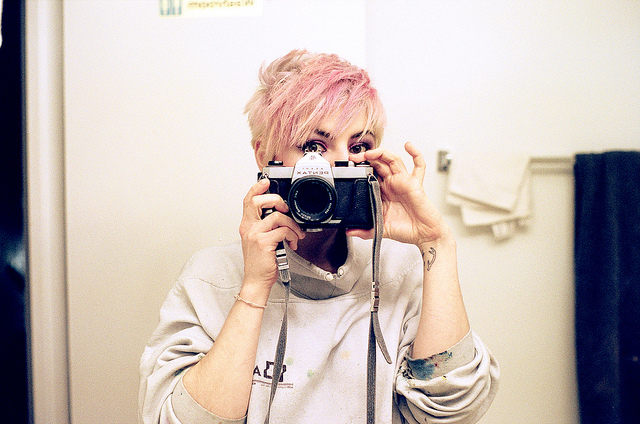
The journey toward self-love is not an easy journey.
However, it could be argued that it is the only journey.
Like it or not (and for many of us, it is not) each of us is inhabiting a unique human body, having our own particular experiences, and perhaps the only thing we are really supposed to do while in this body is figure out how to love ourselves through it all.
If this sounds difficult, then I suspect you are in the good company of just about every other human on the planet.
One thing that helps me understand this journey toward self-love is by contemplating the concept of unconditional love.
Unconditional love is exactly as it sounds: love without conditions.
However, this is not how we have been taught to love.
We have been taught to love people when they act in ways that please us. We have been taught to love ourselves when we are successful at our chosen accomplishments.
But if love is only possible when certain factors are in place, then there are conditions on our love.
It may seem like a simple concept in theory, but it is difficult for almost all of us to comprehend in practice.
We have been trained to believe that more is better when it comes to money, friends or prestige, and less is better when it comes to our weight, level of failure or debt.
Unconditional love doesn’t care about any of this—or does it?
Maybe all the so-called failures that are preventing us from loving ourselves are actually opportunities for us to strengthen our unconditional love.
Here are some hypothetical questions we can ask ourselves to strengthen this concept of unconditional love:
Would I love myself if I weighed 50 pounds more than I do now? How about 100 pounds more?
Would I love myself if I declared bankruptcy and lost my house?
Would I love myself if I were fired from my job or my spouse left me?
Would I love myself if I didn’t have use of my legs, or needed help to use the bathroom?
And of course these situations are not all that hypothetical. Some of those scenarios have probably happened to you (I know they have happened to me), and happen to millions of people around the world everyday.
This is what occurs on the human journey—things change. And not always, or not often, in the way we want. And the real question here is, will I love myself regardless?
This is what it means to unconditionally love.
We all have lists that run through our minds each day of what we need to do to be “better” or “more lovable.”
They usually include being more peaceful, popular, attractive or wealthy.
However, here is the truth: We are ourselves, right now. No matter our weight, level of wealth, attractiveness or popularity we are our own being in this moment.
And this question—can I love myself just as I am, and will I be able to love myself no matter what happens to me?—is not hypothetical.
Whenever we answer no to these questions, we have struck gold. We have found the places we are stuck, the places we resist and the places we really, truly hurt.
When we see these places, we can heal them, and come closer to unconditional love, bit by bit.
Unconditional love for ourselves will never be found by searching for safety.
Safety looks like making a “plan” to get our lives right (which is impossible, by the way). This plan might be to lose weight, get more money or make more friends, as a means to feel less uncomfortable within ourselves—less unlovable.
Now don’t get me wrong, making plans for self-care and for improving the quality of our lives is essential to the journey. But just like everything else, it is all about intention.
If the intention is “I love myself so much, so I am going to meet some new friends because that will make my life even more beautiful,” then we are moving forward in our life full of unconditional love. If the motivation for our new plan is “I am a loser and have failed and would be a better person if I just had more friends,” then we are putting conditions on what has to happen in order to be lovable.
I know I am making those two scenarios sound extreme, but I encourage you to look at your own thought process sometime and take a close look at how you are talking to yourself. Most people will find their thoughts are full of the voice of an inner-bully who never lets up—constantly telling them that they need to improve if they will ever be loved and accepted.
If mindfulness is about noticing the moment exactly as it is, then unconditional love just builds on this notion and asks of us to love ourselves just as we are, in this moment, without conditions.
Some ways to get closer to unconditional love:
>> We can take a close look at where we are conditionally loving our friends and family. We can see where we are holding back our love until others change their actions. If we are holding this attitude for others, then most likely we are holding it for ourselves. When we start to accept others and love them without condition, we soften and find we can do the same for ourselves.
>> We can take a look at our goals. Are they coming from a place of wanting to improve our lives because we love ourselves so much we feel we deserve to feel our best? Or are they coming from an attitude of inadequacy and feeling like we won’t be enough until we change? If we find our goals are coming from the latter, then we need to adjust the said goals accordingly.
>> We can ask the (not-so) hypothetical questions presented above, and then ask ourselves, “Can I love myself no matter what happens?” Imagine the attitude it would take to unconditionally love yourself if you had no legs, couldn’t talk anymore or had to buy a whole new wardrobe due to weight gain or weight loss (or consider the the attitude it did take if this has occurred for you). Imagining worst case scenarios and how we would adjust into unconditional love helps us to love ourselves now with all our present perceived imperfections as they are.
Everyone on the planet is going to have changes to their bodies, finances and relationships that aren’t pleasant. If we can learn to unconditionally love ourselves through every mistake, failure, accident and challenge we will know our soul development is in good hands—our own!
Author: Ruth Lera
Image: Laura D’Alessandro/Flickr
Editor: Emily Bartran






Read 0 comments and reply